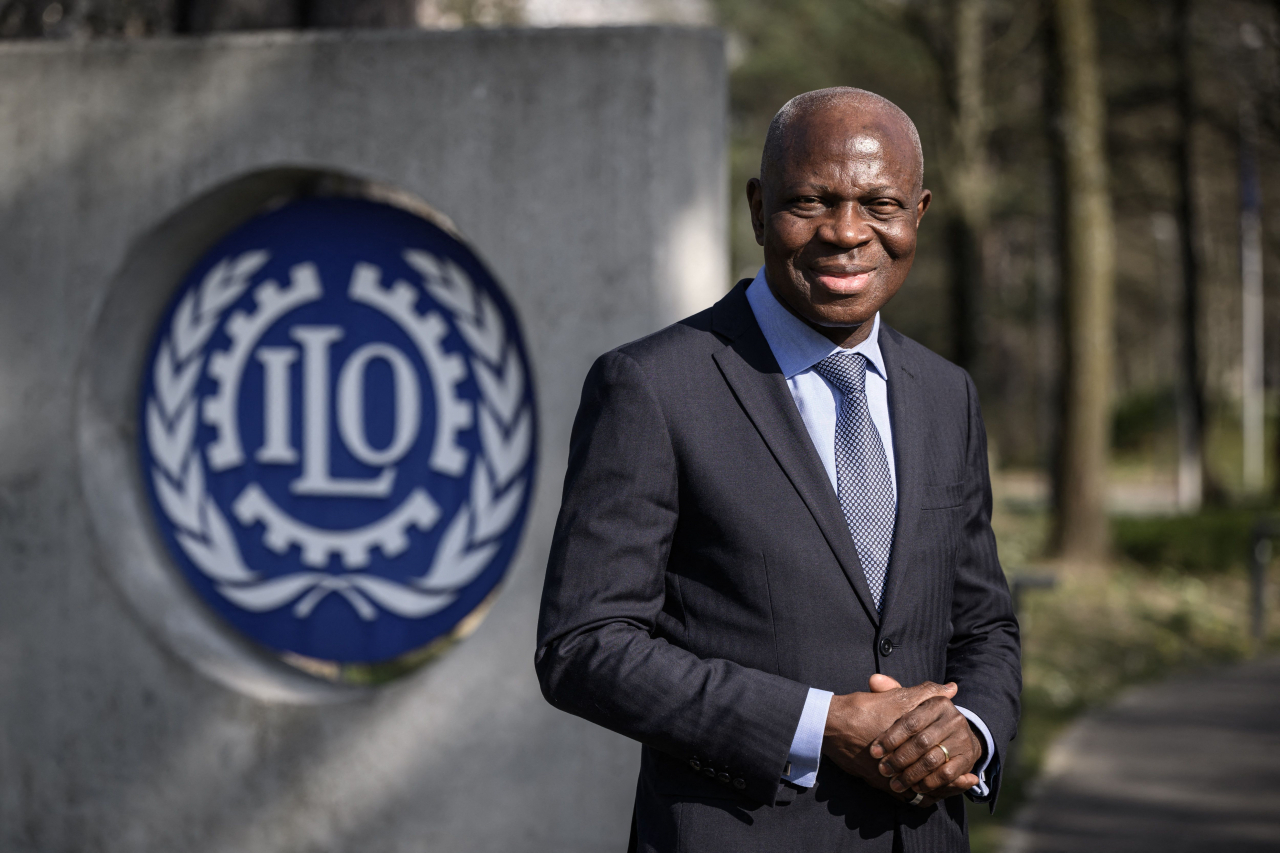 |
New International Labour Organization (ILO) Director-General Gilbert Houngbo poses after he was elected last Friday in Geneva. - Houngbo, a former prime minister of Togo, was elected the next head of the International Labour Organization, and will become the first African to lead the UN agency. (AFP) |
GENEVA (AFP) -- Gilbert Houngbo, the former prime minister of Togo, was on Friday elected the next head of the International Labour Organization, and will become the first African to lead the UN agency.
After two rounds of voting, the ILO's governing body elected the 61-year-old to succeed British trade unionist Guy Ryder, who steps down at the end of September, after 10 years in the job.
"You have made history," Houngbo told the governing body after the election.
"I am deeply and absolutely honoured to be the first representative of the African region to be selected to lead the ILO after 103 years."
Houngbo was chosen from among five candidates and had been seen in a strong position after the African Union threw its weight behind him.
Currently head of the Rome-based International Fund for Agricultural Development (IFAD), he also enjoyed strong backing on the labour side.
His opponents in the race were former French labour minister Muriel Penicaud, South Korea's ex-foreign minister Kang Kyung-wha, South African entrepreneur Mthunzi Mdwaba, and ILO deputy Greg Vines of Australia.
'Rich symbolism'
Houngbo's win marks a dramatic shift for the ILO, which since its founding in 1919 has been led only by men from Europe or the Americas.
The oldest specialised UN agency has 187 member states, which are, uniquely in the UN system, represented by governments, employers and workers.
The organisation's governing body counts 56 members, with half of them representing governments, and a quarter each representing employers and workers.
Friday's vote took place by secret ballot behind closed doors.
The ILO said Houngbo received 30 votes in the second-round voting, securing the majority. Penicaud received 23, Kang two and Mdwaba one.
After the first round, Vines was eliminated.
Houngbo, who was born in rural Togo in what he has described as "extreme poverty", hailed the "rich symbolism" of his win.
The vote outcome, he told the governing body Friday, "fulfils the aspirations of a young African, a young African boy whose humble upbringing turned into a lifelong quest for social justice."
The married father-of-three has spent much of his career working with international organisations.
He has previously held several high-level positions within the UN system, such as finance director at the UN Development Programme (UNDP) and deputy director-general of ILO itself, from 2013-2017.
Houngbo will take the ILO helm on October 1 and will have his work cut out as the organisation strives to adapt its norms to a world of work rapidly transforming due to evolving technologies.
The Covid-19 pandemic has only sped up those changes, leading to the rapid uptake of virtual technologies to enable remote working.
'Unifier'
"We must respond in a concrete manner to the socioeconomic consequences ... of Covid-19," he told AFP in an interview, pointing in particular to the impact on many people in the informal sector, with no safety net.
"My ambition, my dream, is to run this organisation, which should lead on ensuring that every household... should have minimum social protection."
While stressing the need to protect workers' rights, Houngbo, who has also worked in the private sector, including at Price Waterhouse, Canada, insisted that he as ILO chief would equally represent the interests of governments and employers.
"I am at the middle," he told AFP.
"I think that in a role like mine, the role of director-general, one must be a unifier. That is the challenge."
With his win, the ILO will become the third large international organisation in Geneva to be headed by an African, after the World Health Organization elected its first African leader in 2017, as did the World Trade Organization last year.
Houngbo stressed he was not coming in as the representative of a single region.
"Although my origins are African, my perspective is global," he said.
"In an age, unfortunately, of divisiveness, my commitment to be a unifying director general stands firm." (AFP)








![[Today’s K-pop] Blackpink’s Jennie, Lisa invited to Coachella as solo acts](http://res.heraldm.com/phpwas/restmb_idxmake.php?idx=644&simg=/content/image/2024/11/21/20241121050099_0.jpg)